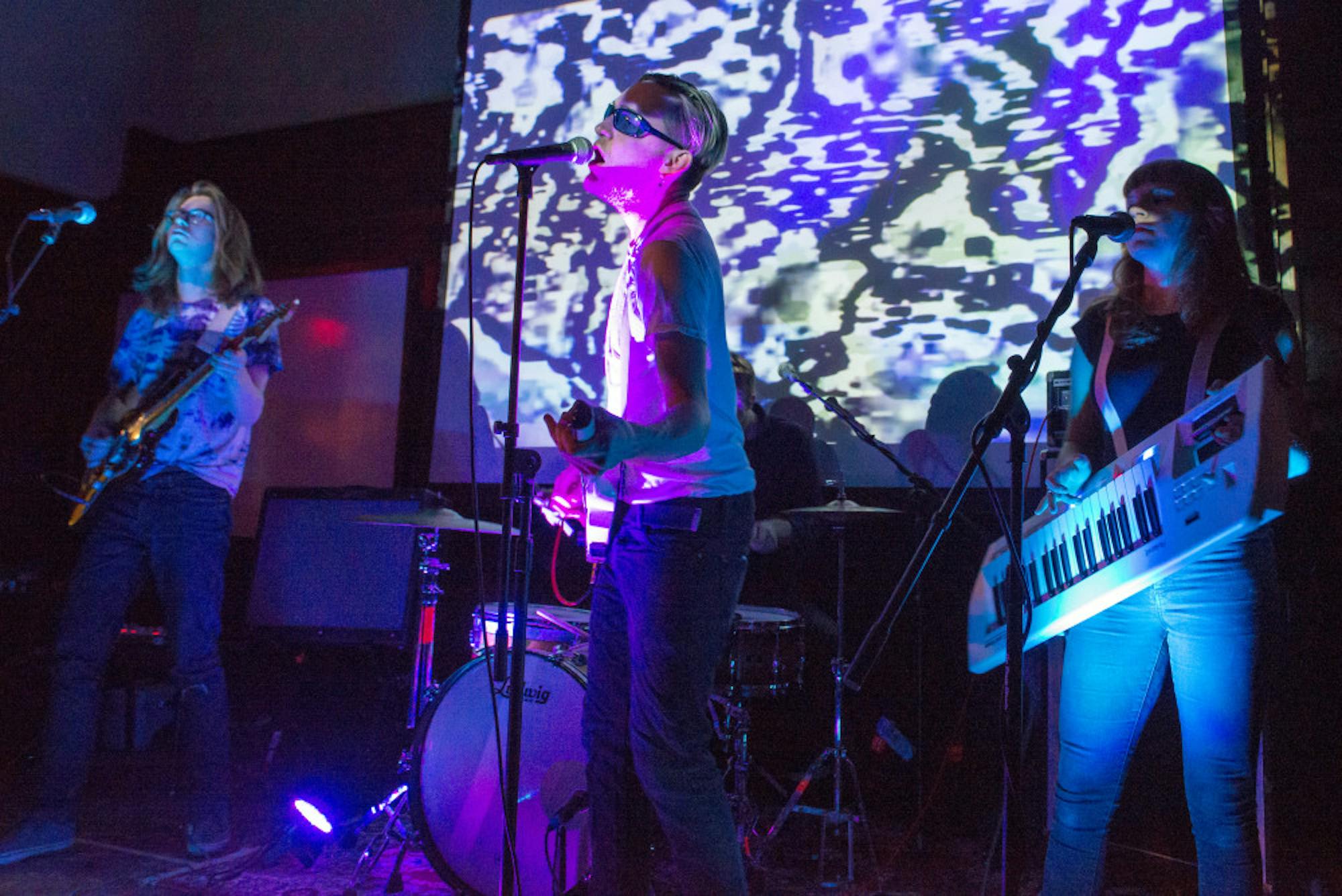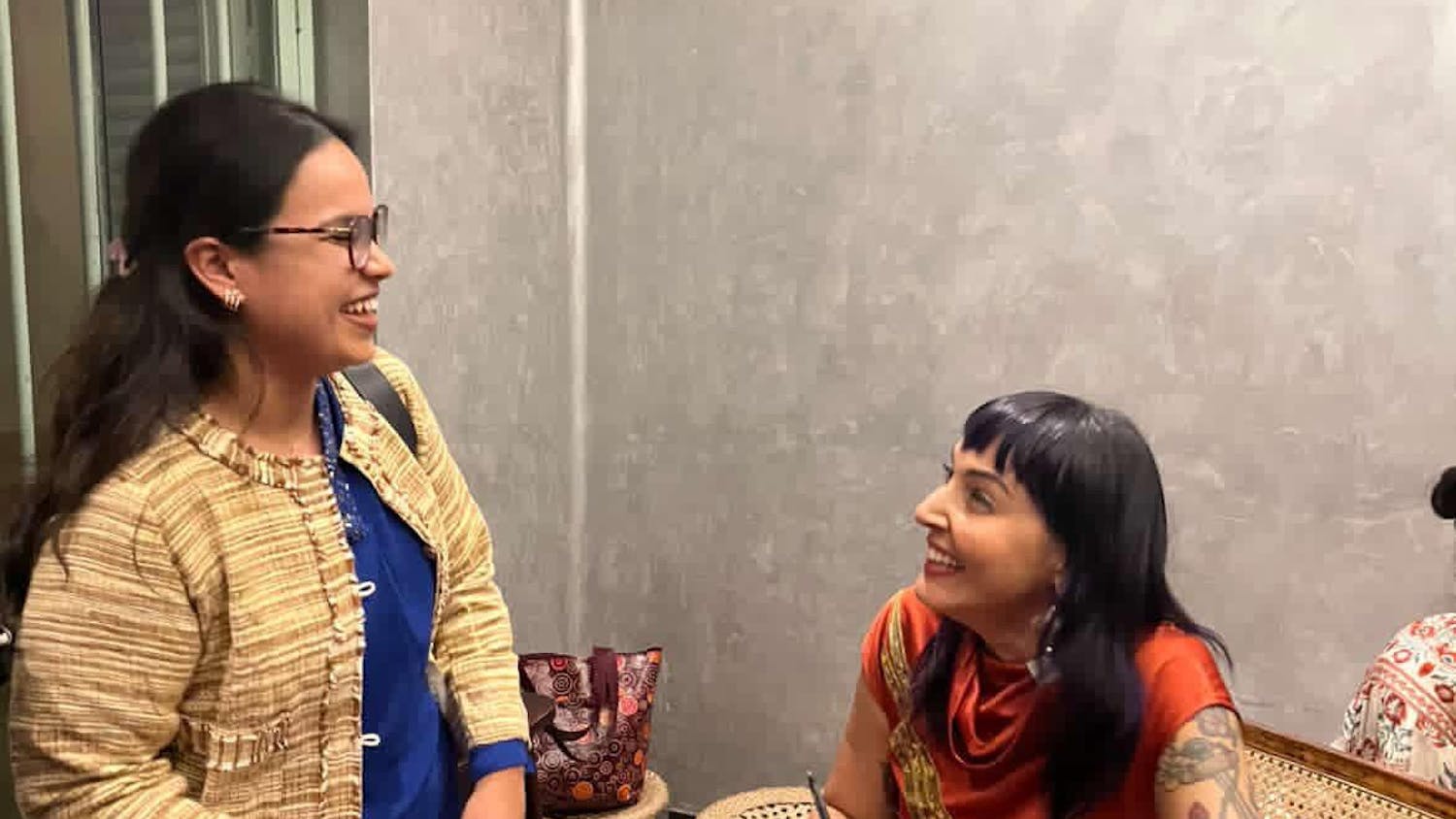On certain weekend nights, the Arts Haus living room, cluttered with the typical jumble of homework, snacks and backpacks, quickly transforms into a free concert venue outfitted for over 100 college students.
These bi-monthly shows are coordinated by Applejam Productions, the self-described "DIY booking agency" run by a handful of Tufts undergraduates. At its helm are co-presidents senior Sasha von Didkovsky and sophomore Cole Wennerholm, whose room on the first floor of Arts Haus stands as the backdrop for these events.
Utilizing the budget granted by Tufts Community Union, Applejam reaches out to small local artists and Tufts bands, booking both a headliner and a student opener twice per month. This past semester, they’ve already held three concerts, including a performance by Native Sun, a NYC-based punk band, a Valentine’s cover show that featured nine different Tufts musicians and its most recent show featuring Medford-famous Matt Farley.
“We mostly work to email artists and figure out who we can get to play here and then we work with different people on campus to host it and set up, break down, do the whole thing,” Wennerholm said.
Whereas in the past Applejam hosted more events in the larger classroom areas like the Crane Room, this semester the new leadership pushed past tradition and restructured its shows to take place in residential housing like Arts Haus and Crafts House, providing a more intimate space with a greater appeal to its casual vibe. The restructuring seems to have proven successful, improving overall attendance and allowing for an increased number of shows.
“The first two shows we had this semester we also had a line outside," Wennerholm said. "So, we had like 120 people inside, and then we had to cap it and hold people out.”
Applejam has been putting on more shows than ever before. Von Didkovsky attributes these changes to a realization he'd had of their opportunity as co-presidents to implement new ideas instead of relying on past club norms.
“I sort of had this moment ... Cole and I are the presidents now, we can do anything we want to do," von Didkovsky said. "We don’t have to have shows in the Crane Room, we don’t have to try to get the biggest person we can with our tiny budget. We can just put on a bunch of shows in small, cool venues where we way overpay these small bands.”
Arts Haus, as of late, has provided the perfect space to host Applejam's events. Dani Coates, who is the current house manager, describes the collaboration as an alignment of stars between the two already-intertwined groups — especially since both von Didkovsky and Wennerholm have lived in Arts Haus.
“Somewhere at the end of last semester, all three of us … came together on it at the same time and were like 'Why are we not doing this here?” Coates, a junior, said.
In an email correspondence, John Wescott, associate director for campus life programming and a primary contact for Applejam, noted that Applejam's natural leadership transitions, involvement of former presidents and the current presidents’ proactive communications with the Office for Campus Life have culminated in a smooth operation this year.
“The group is pretty amateur, for a lack of better word, when it comes to talent buying and concert production, but they have been able to get some really great shows that students get very excited for, all with a relatively low budget and minimal production,” Wescott wrote in an email to the Daily.
Featuring a diverse array of genres — from punk to indie jazz to all-metal to brass — Applejam serves as a venue for discovery, aiming to reach beyond the typical college music scene and to introduce new experiences for the attendees and exposure for the talented artists.
“Even if we used all our budget on one person, our budget is not big enough to hire somebody where people are like ‘Oh my god! They got, 'fill in the blank!' Let’s go see them!’ They are coming to Applejam: The Event ... let's just book people who we know are good, who nobody knows, but [people] are going to show up to the event and ... be like ‘oh my god, who are these guys,’” Didkovsky said.
The variety of bandshas provided an outlet for otherwise unknown artists. For von Didkovsky, seeing the enthusiastic response from underclassmen has been particularly encouraging and reminiscent of his own thrilling discovery of heavy metal, punk and noise rock.
The presidents noted that different artists bring different energies. Some people have demonstrated excitement for the Tufts openers, while the headliners attract varying degrees of interest.
The group's most recent performance, which took place on Friday, Feb. 28, featured a comedy-oriented show by Matt Farley, known for the “Medford Song.” Students described Farley’s contagious energy and good spirit, as he rallied the audience to sing along with songs they had never heard before.
“Nobody had been singing along and then [Farley] goes, 'the Egyptians couldn’t have done it, they couldn’t have planned it, they must’ve needed help from another PLANET!' And everyone hit 'another planet' at the same time," von Didkovsky said. "It was … this beautiful moment where people were realizing what the line was going to be as it was coming up. It was like this enormous improv. It was wonderful. I love[d] it.”
Von Didkovsky and Wennerholm also spoke to the vision of past president Eleana Tworek, who they said inspired their drive to expand Applejam’s repertoire beyond "sad … indie" music — a community of music they felt was most dominant in the college space.
“We are going to be getting queer acts, we are going to be getting women, we are going to be getting people of color, we are not just going to do indie, we are going to do weird, you know, experimental rap and, you know, whatever else,” von Didkovsky said. “[Tworek] has been really big on making sure that our lineup is not just what it could easily sink into being.”
By hosting substance-free events, Applejam aims to provide a safe and fun environment centered around music and community experience.
“What I really like about Applejam is that it’s not exclusive at all," Adrian Tanner, a past performer, said. "It’s not about who you know, it’s not about how cool you are. Basically, everyone can get in, assuming the room is not packed, and I think that is really good. I like that that's a contrast to the party spaces that already exist.”
Von Didkovsky echoed Tanner's sentiments and encouraged anyone interested in joining Applejam or booking specific bands to start early and demonstrate initiative. He noted that students can get involved simply by connecting with himself or Wennerholm.
"What I appreciate about it is the inclusivity aspect of it," von Didkovsky said. "That the barrier to entry is so low ... you just have to meet us at a party and then you can play the next show."
However, as the club continues to receive increased exposure and attendance, the structural limits of residential spaces could and already have begun to be a problem, von Didkovsky said.
“They had to have a guy come and look at the structural integrity of the house because people were moshing too hard," von Didkovsky said in regards to a previously held punk show. "They were worried that we were going to cave the floor in."
Moreover, with the recent push to maximize on-campus housing, Arts Haus is scheduled for renovations that would remove upper common areas in exchange for dorms, according to Coates. Fortunately, Coates said, the first floor event spaces will be preserved.
“If we don’t have any common rooms ... we can’t have any events. There’s no point having any themed housing — it might as well be Carpenter House, like it’s a dorm,” Coates said.
After recently stumbling upon an old Applejam website, the co-presidents said that they gained new insights into the history of the club, which was originally founded in the 1970s. Discovering the site inspired von Didkovsky to reach out to old presidents, one of whom told him that prior performance sites included Carmichael Hall’s common room and assorted basements.
“We discovered a list of bands that they had booked … from 2001–05, containing some crazy names. Arcade Fire, Yo La Tengo, Bombay Bicycle Club. Arcade Fire played here, in Hotung [Cafe], in like 2005, when they were still 'The' Arcade Fire,” Wennerholm said.
Wennerholm is particularly excited to expand the club to include a visual arts and writing aspect through the recent creation of a magazine that he hopes will draw in greater participation to the otherwise small team of five to seven students. He said that they are especially looking to connect with SMFA students.
“At the end of the day, whether it be overpaying small artists, setting up shows for people to discover new music or getting people involved with a publication, we are mostly just trying to utilize the resources given to us to get the most people involved,” Wennerholm said.
Von Didkovsky, who is enrolled in the Tufts-SMFA dual degree program and pursuing English with a minor in computer science and studio art, currently illustrates the cover art for the organization's Facebook events — which are the group's primary means of advertisement, aside from word-of-mouth. The club also has an Instagram account titled @applejamproductions.
The next Applejam show will occur on March 27, featuring a student DJ set, Tufts' own Frog People and a punk group called Dog Date hailing from the tri-state area.
“I think this semester, having more shows, we’ve really been trying to have a good diversity of sound … We want it to be very accessible to people and for people to experience the type of show that they wouldn’t go out and seek for themselves,” Wennerholm said. “We try to just have a little bit of everything and try to change it up as much as we can.”
Applejam Productions puts on mix of on-campus concerts

Future Punx is pictured performing at a concert organized by Tufts Applejam in the Crane Room on Feb. 27, 2015.





